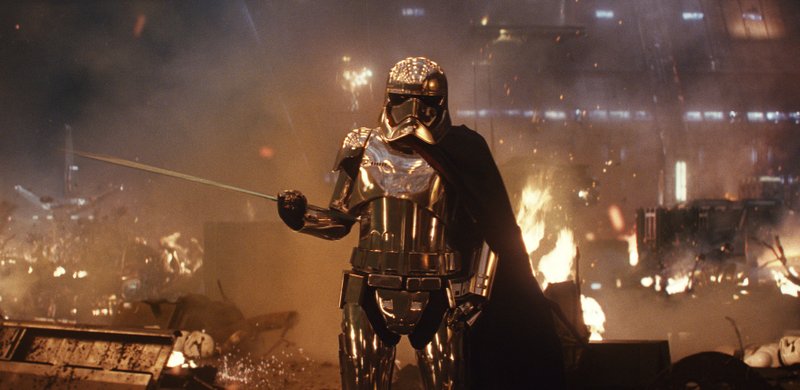A welcome disturbance in the Force, Rian Johnson's "The Last Jedi" is, by wide measure, the trippiest, scrappiest and most rule-breaking "Star Wars" adventure yet.
Not the exercise in nostalgia that was J.J. Abrams' "The Force Awakens," Johnson's Episode VIII takes George Lucas' space opera in new, often thrilling, and sometimes erratic directions while finding the truest expression yet of the saga's underlying ethos of camaraderie in resistance to oppression. Though there are countless familiar broad strokes — rebel escapes, Jedi soul-searching, daddy issues — "The Last Jedi" has discovered some new moves yet, in the galaxy far, far away.
As the second installment in this third "Star Wars" trilogy, "The Last Jedi" is like the inverted corollary of "The Empire Strike Back" (long the super fan's favorite). While it is, like its part-two predecessor, often murky and weird, Johnson's frequently comic film distinguishes itself by upending the traditional power dynamics of heroes and bit players in the Star Wars galaxy.
Here, the odds-defying daredevil flyboy (Oscar Isaac as Resistance pilot Poe Dameron) is an impetuous chauvinist, at odds with a female commander (a purple-haired Laura Dern). "Get your head out of your cockpit," admonishes Leia (the late Carrie Fisher, to whom the film is dedicated). The master-apprentice relationship — previously Yoda instructing young Luke Skywalker (Mark Hamill) on a swampy remote planet — is now tilted more toward Rey, the young Jedi (Daisy Ridley), sent to stir a monkish Skywalker from a windswept, Porg-infested isle. And instead of a Tauntaun's guts being spilled, there are even moments of animal rights reflections creeping into the galaxy. About to bite into his rotisserie dinner, Chewbacca, with a sad groan, is struck by pangs of doubt.
Abrams's finest touch in his zippy and nimble reboot was in his diverse casting — in particular Ridley and John Boyega, as Finn, the Stormtrooper turned good guy. But Johnson, who also wrote the film, has gone further to shake up the familiar roles and rhythms of Star Wars. Scattershot and loose-limbed, "The Last Jedi" doesn't worship at its own altar, often undercutting its own grandiosity.
Those breaks of form — formerly mostly reserved for a smirking Harrison Ford — will throw some diehards. Especially in the surreal isolated scenes of Rey and Luke — where Luke, with a thick gray mane and a hermit's foul-manner is seen drinking a creature's breast milk and pole-vaulting from rock to rock — "The Last Jedi" teeters on the edge of camp.
It's not surprising that Johnson, the director of the twisty time-traveling noir "Looper," has made a movie full of clever inversions. What's jarring is that he's made a "Star Wars" film that tries to not take itself too seriously, while simultaneously making it more emotional.
Yet before its considerable payoff, "The Last Jedi" feels lost and grasping for its purpose. Unlike the earlier films, the less tactile "The Last Jedi" isn't much for world building, and its sense of place isn't as firm. As an intergalactic travelogue, it's a disappointment.
There are exceptions, though, especially the chambers of the Supreme Leader Snoke (Andy Serkis, adding to his gallery of grotesques). Soaked in an otherworldly crimson red, Snoke's lair looks like something out of Kubrick's "Eyes Wide Shut."
Johnson also lacks what Lucas and Abrams alike recognized as the franchise's most potent weapon: Ford. As the prairie boy turned knight, Hamill has never been the saga's heart-and-soul. While Luke gets his big moment, "The Last Jedi" doesn't do him any favors, plopping him on a pitiless jagged rock away from the action and a backstory filled with regret.
As Fisher's final "Star Wars" film, it's a shame she isn't more front-and-center. (The next film was to be hers, the way Ford and now Hamill have had theirs.) But she makes her scenes count.
Though Isaac has been fashioned as the heir-apparent to the bemused Ford, Boyega is the actor I've left both episode VII and VIII wanting more of. The downside in a story that spins its characters around the galaxy is that the new generation of Star Wars protagonists hasn't had time for the small gestures that would shape their characters — close-ups that their forerunners were afforded. Even after two films, Rey is more of an unstoppable sprite than a fleshed-out person.
But "The Last Jedi," as if with a wind against its back, gathers momentum. By breaking down some of the old mythology, Johnson has staked out new territory. For the first time in a long time, a "Star Wars" film feels forward-moving.
Much of that sense of progress comes in the character of Rose Tico (a superlative Kelly Marie Tran), a maintenance worker who's thrust into a pivotal role in the rebellion. It's she who voices the film's abiding message, one that — as the first "Star Wars" film of the Trump era — has affecting resonance. The Resistance will win, she says, "not fighting what we hate" but "saving what we love."
In a pop culture juggernaut as imposing as Star Wars, these moments carry more meaning than they would elsewhere. After long skating around anything political, "The Last Jedi" — whether it's meant to be or not — has the tenor of a rallying cry. Johnson has fully internalized a single line of dialogue from "The Return of the Jedi" — "You rebel scum," said with disdain by a Nazi-like lieutenant — and turned it into a badge of pride.
"Star Wars: The Last Jedi," a Walt Disney Co. release, is rated PG-13 by the Motion Picture Association of America for "sequences of sci-fi action and violence." Running time: 152 minutes. Three stars out of four.
MPAA Definition of PG-13: Parents strongly cautioned. Some material may be inappropriate for children under 13.

